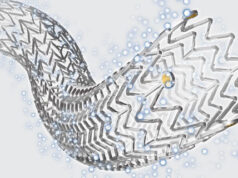
Positive results from the RANGER SFA trial for Boston Scientific’s Ranger paclitaxel-coated percutaneous transluminal angioplasty (PTA) balloon catheter have been presented at the 2017 CX Symposium in London, UK. Data demonstrated that the drug-coated balloon (DCB) exhibited both a high rate of primary patency and freedom from target lesion revascularisation at 12 months, reducing the need for re-interventions to re-establish flow in previously blocked blood vessels.
The prospective, randomised, controlled trial, comparing the Ranger DCB to uncoated PTA balloons, included 105 patients with femoropopliteal lesions, at ten centres in Europe. Results demonstrate 86% primary patency and 91% freedom from target lesion revascularisation; both findings statistically significantly higher than the control arm of patients treated with an uncoated balloon. Patency was assessed by duplex ultrasound at 12 months post-procedure. Eighty-four per cent of patients in the Ranger DCB group presented either with no or mild symptoms associated with claudication, or pain while walking. There were no target limb amputations.
“The rates of primary patency and freedom from target lesion revascularisation are amongst the highest observed in this type of first-in-man trials at one year,” says Dierk Scheinert, chairman Division of Interventional Angiology, University Hospital Leipzig, Germany, and principal investigator of the RANGER SFA trial. “As a clinician, it is important to have a treatment option…that exhibits consistent performance and outcomes; for patients, these attributes impact their quality of life such as alleviating pain and discomfort, as well as reducing the probability of repeat procedures.”
To expand upon these findings, Boston Scientific recently received approval to commence enrollment in the RANGER II SFA study, a randomised United States Food and Drug Administration Investigational Device Exemption trial designed to evaluate the safety and efficacy of the Ranger DCB versus standard PTA balloons. Anticipated enrolment will include up to 400 patients in 70 centres in the USA, Canada, Europe, Japan and New Zealand. Data from the RANGER II SFA trial is expected to support regulatory submissions in the USA and Japan.
The Ranger drug-coated balloon received CE mark in June 2014.











